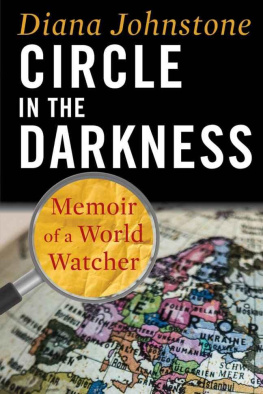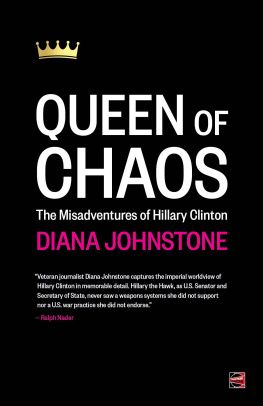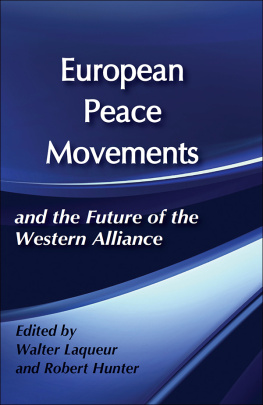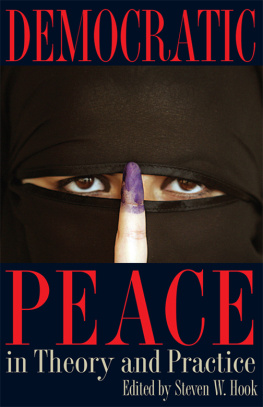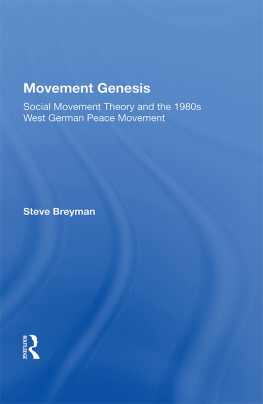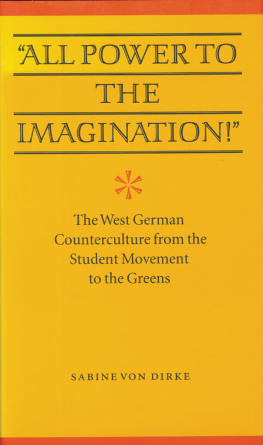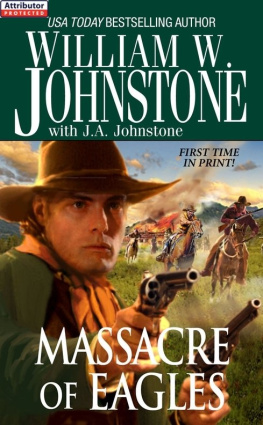2020 Diana Johnstone
ISBN: 978-1-949762-13-6
EBOOK ISBN: 978-1-949762-14-3
In-house editor: Diana G. Collier
Cover design: R. Jordan Santos
ALL RIGHTS RESERVED: Except for purposes of review, this book may not be copied, or stored in any information retrieval system, in whole or in part, without permission in writing from the publishers.
Library of Congress Control Number 2019952337
Clarity Press, Inc.
2625 Piedmont Rd. NE, Ste. 56
Atlanta, GA 30324, USA
https://www.claritypress.com
Table of Contents
To Jean Bricmont,
who persuaded me to write this book,
and provided me with his encouragement
and good cooking all the way.
PART I
Looking for the World
Memories of Memories
What one calls childhood memories are really memories of memories. Moments or incidents that one recalled, and later recalled having recalled, and that became part of a limited repertoire of the tiny spots of light in a very long darkness of forgetfulness. To what extent is the adult really the same person as the child?
My very earliest memorized memory is a dim recollection of a family picnic in the woods and seeing a man with a dog walking along the edge of a nearby cliff. I was afraid that the dog would fall off. When much later I asked my grandmother when that could have been, she was able to date the picnic; I was eighteen months old at the time. That was an early indication of my lifelong fear of fallingor more precisely, my fear of seeing others fall. Animals and fear of falling: basic baby attention-getters. And I was already worrying.
The first lesson in life that I can recall came from my maternal grandmother, whom I called Ooma. It must have been when I was three or four, staying with my grandparents in Saint Paul as my mother went to work for the New Deal in Washington. When going to bed at night, I must have been afraid of the dark. Ooma intervened decisively. When youre afraid of the dark, say boo to the dark, and the dark will be afraid of you. That advice stayed with me all my life.
Early memories are mostly atmospheric: the sunshine and clouds in the garden, and the large threatening hollyhocks. Or the much bigger garden, practically a farm, of my paternal grandparents in Excelsior, Minnesota, where grandfather Bruff tried to chase birds out of the fruit trees and the neighbors turkeys out of the vegetable patch. I picked strawberries and was encouraged to go into the hen house and steal eggs from the hens, who hardly seemed to mind. And the lakes, the Minnesota lakes, so peaceful, and sky so blue.
But what concerns me mainly is to evoke the Zeitgeist, glimpsed even at an early age, whose changes, and the awareness of how much they change, are the main treasure of old age. This is not nostalgia, although it may sound like that. Rather it is the lived experience of the transitory nature not merely of things (which have been drastically transformed in my lifetime) but especially of the moral environment.
The period called the Depression was a moral environment, and I was born into it. Or it was around us, as we were safe and secure in the home of grandfather Elmer Bonnell, whom I called Boopa, as he was principal of Harding High School. All was calm, and walks were taken between the spaced trees on the campus of neighboring Macalester College. Only one adventure was known to have intruded into this middle-class paradise. In the dark eternity before I was born, a family up Vernon Avenue had rented their house for the summer to an uncertain number of persons who kept the window shades down and were almost never seen. It turned out they were Chicago gangsters hiding out either from the police or from competitors. It ended badly, but I dont recall the details. People on Princeton Avenue still talked about it, but the adventure dated from an earlier era, the era of prohibition, which had been ended by the god of my childhood, Franklin Delano Roosevelt.
The Bonnells had no economic worries but shared a general concern over the fact that so many people were out of work, hungry, desperate. The magazines showed color photos of big dinners and the radio broadcast lots of jokes and laughter, but the poor people were all out there, dressed in their shabby best, looking for work.
My paternal grandparents had a harder time since my grandfather Bruff had lost his job, but they ate well from their gardens, and my grandmother Maude earned money for playing organ in church and piano in the Sunshine Home on Lake Minnetonka, where she took me to see the old people sitting in deep chairs on the wide white porches. For a while, she took in a foster child called Glen. Everybody worked on odd jobs. My father worked for a while in the local amusement park, and even as a professional baseball player. Their problems were more psychological than material. They were all too aware of being poorer than Maudes stock broker cousin Roy Howard, who lived on the top of the hill in a house with a lily pad pond. The feeling of failure haunted Bruff, whereas Maude expressed her indignation (as I learned much later) by voting Socialist in the 1932 election, as did my father.
Until 1932, the ideological divide in Minnesota had been essentially between Republicans and socialistswhether the Socialist Party or the local Farmer-Labor party, which in 1930 won the governorship. Both attitudes were a pretty fair, rational reflection of the differing attitudes between business people and workers in a state which blended New England Yankees with hard-working Germans and Scandinavians, all pretty much united against Eastern Banks but at the same time rather internationalist in outlook. But in the 1932 presidential election, the political landscape altered when Franklin D. Roosevelt defeated the Republican incumbent, Herbert Hoover, by three to one. Just as Germany was acquiring its demon, Adolf Hitler, the United States was acquiring its first Great Man since Abraham Lincoln, but a Democrat this timea party known for its Southern white segregationists who ran most Senate committees and its northern city political machines that juggled ethnic clans, both of whom tended in their contrasting ways to get in power and stay there until late retirement. The ambiguity of the multi-faceted Democratic Party required a leader who was Above It Allbecause there was too much questionable stuff down below. Part of being above it all was to create his own brain trust, to bring people into government on the basis of ability and conviction rather than the spoils system.
The New Deal
Considering how totally FDR dominated the United States during his dozen years as President, it is somewhat surprising how quickly he was forgottenmuch more quickly than John F. Kennedy, who was stopped from completing his four-year term. JFK was more romantic and left behind him the disappointed hopes for what might have been. FDR took America in and (almost) out of World War II and died exhausted in April 1945. There was not much more to expect.
Early in the New Deal, in 1934, while my father was completing his doctoral thesis in Minnesota, my mother Dorothy took her Phi Beta Kappa key to Washington and went to work for the Social Security Administration. In the fall of 1936, the little family was united in an apartment just behind the Supreme Court building in Washington. My father was doing research in the neighboring Library of Congress, and it was there that I encountered my first deity, known as the mosaic Minerva. I was hugely impressed. An even more pagan divinity, next to the Folger Shakespearean Library, was the statue of Puck from Midsummer Nights Dream, with the inscription Lord, what fools these mortals be, which was the first sacred text I ever memorized.

